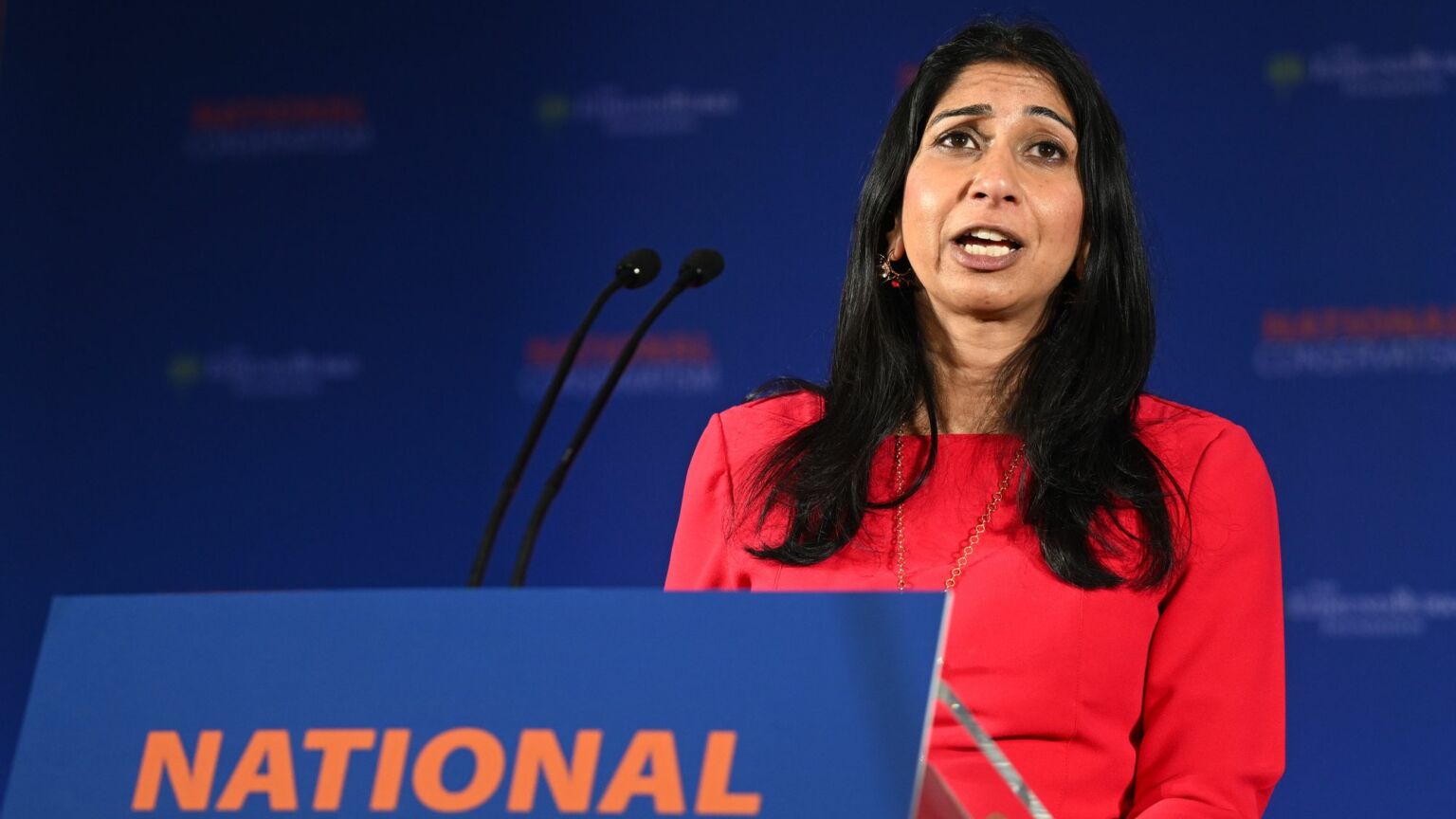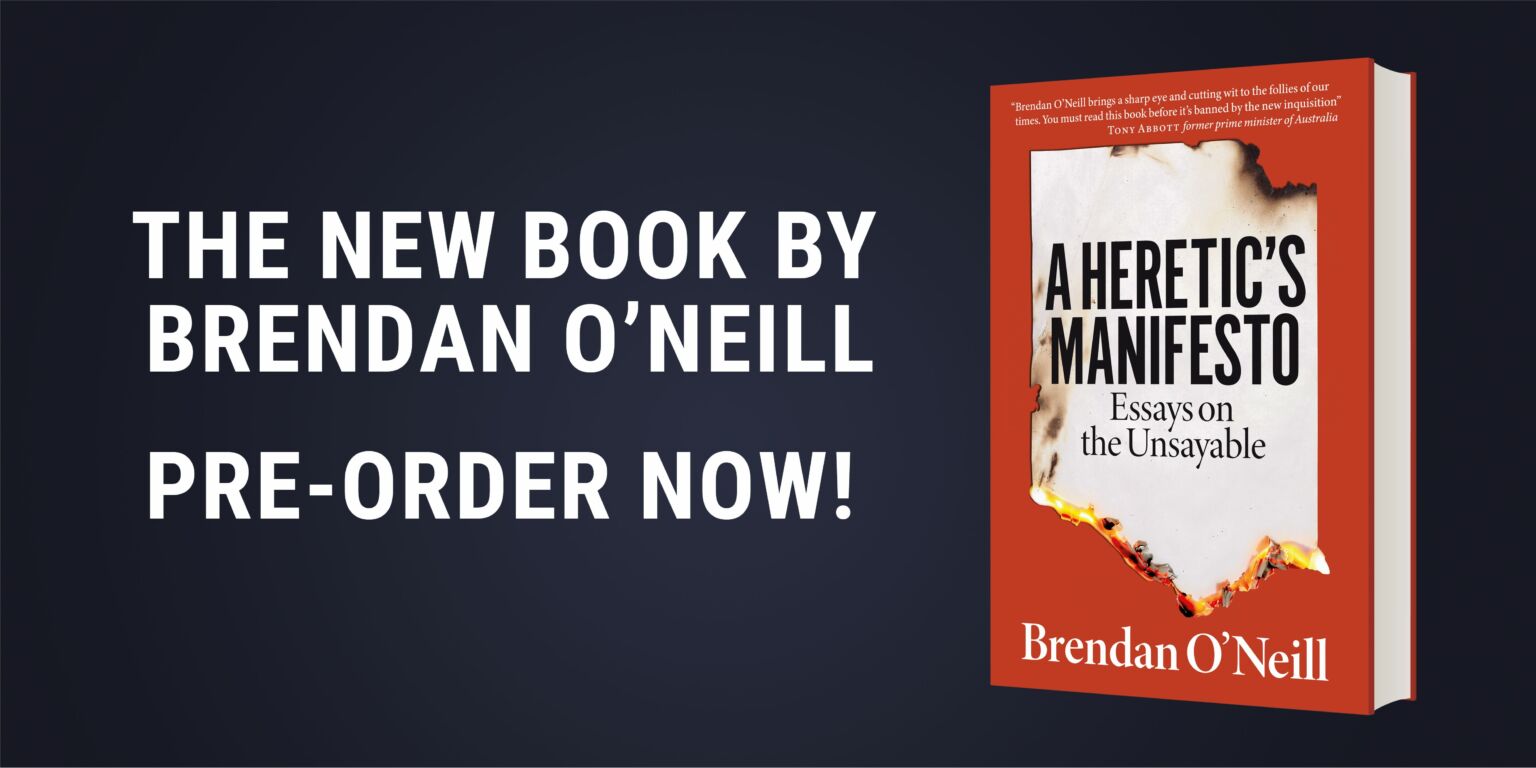The dangerous nonsense of white guilt
Woke identity politics risks fuelling white identity politics.

Want to read spiked ad-free? Become a spiked supporter.
‘White people do not exist in a special state of sin or collective guilt. Nobody should be blamed for things that happened before they were born.’
In a sane society, this would not be considered a controversial statement. But when UK home secretary Suella Braverman uttered these words, at the National Conservatism conference in London on Monday, the great and good of the British media were scandalised and shocked.
‘Do you think a British home secretary should say this? Do you understand why she feels compelled to say this? Did you ever expect a British home secretary to say this?’, asked ITV’s Robert Peston on Twitter, nudging his followers towards a conclusion that he, as an oh-so-impartial journalist, obviously daren’t utter himself.
Similarly, the i’s Paul Waugh coyly portrayed these lines as part of the ‘battle for white working-class voters’, an ‘overreach in rhetoric’, and an attempt to import the tactics of the ‘American hard right’.
Others more firmly rejected Braverman’s offer of absolution from their white guilt. ‘As a white person, we must recognise our privilege under white supremacy, colonialism and imperialism’, said prominent human-rights barrister and self-appointed spokeswoman of the whites, Charlotte Proudman. ‘So yes, we should feel guilty and ashamed.’
While Braverman’s blast against white guilt was hardly the only news line to emerge from that speech – in which she also bashed her own government over immigration policy and all but pitched herself to be the next PM, even laying out her family backstory – those two lines and the pearl-clutching that followed them are worth dwelling on.
Indeed, it shows how upside-down our debate about race and identity has become. Our cultural elites now treat commonsense statements as outrageous, and genuinely outrageous statements as commonsense. Worst of all, in the name of ‘anti-racism’, they are re-racialising society.
Firstly, the notion that white people today bear collective guilt for slavery, colonialism or historical racism is an affront to reason. No one can or should be held responsible for atrocities that happened decades if not centuries before they were born. White guilt only really makes sense if you believe white people have some collective, spiritual essence that transcends space and time.
This is all particularly ridiculous given that the vast majority of white Brits around today are not descended from the narrow cast of merchants, slavers and aristocrats whose families were involved in, or directly benefited from, colonialism and slavery. What’s more, as Kenan Malik has pointed out, poor and working-class white people were racialised by the British ruling class well into the 19th century: they, too, were considered racially distinct and congenitally inferior to well-to-do whites.
Now, I’m not suggesting that aristocrats and royals atoning for the crimes of their ancestors is necessarily a sign of progress, either. As James Heartfield argued on spiked recently, apologising for slavery has become a kind of status symbol among old money. This self-flagellation has become a performance of enlightenment, a statement of how much more ‘aware’ these people are than the lower orders.
But there is still something particularly obnoxious about demanding today’s white working-class people – who share many struggles in common with their black and brown workmates – feel ashamed for the sins of a long-dead establishment. White guilt, like ‘white privilege’, treats white people as a classless, monolithic bloc, with shared interests and a ‘white’ inheritance.
Which brings us to the central issue with so-called white guilt. It racialises society in the name of atoning for racism. It encourages white people to think of themselves as a distinct group – as a racial identity. It shouldn’t really need saying, but this is a bad road to go down.
One of the reasons that woke identitarianism is so dangerous is that it risks reviving white identitarianism. The far right has for years been latching on to the new racial victim politics to present white people as the truly put-upon group. The slogans of the identitarian left are being consciously inverted, like when that EDL fanboy flew a banner declaring ‘White Lives Matter’ over Manchester in 2020.
By urging white people to think of themselves in racial terms, as the guilt-ridden beneficiaries of white privilege and past injustice, the elites are opening the door to old-fashioned racists who are keen to put a more positive spin on ‘whiteness’. The flipside of white guilt is white pride.
This is a danger that the great African-American author, Zora Neale Hurston, a central figure in the Harlem Renaissance, identified a century ago, from the opposite vantage point. She rejected collective black pride for the same reason that she rejected collective black shame:
‘Suppose a negro does something really magnificent, and I glory, not in the benefit to mankind, but in the fact that the doer was a negro. Must I not also go hang my head in shame when a member of my race does something execrable? The white race did not go into a laboratory and invent incandescent light. That was Edison. If you are under the impression that every white man is an Edison, just look around a bit.’
White guilt is not just nonsense – it’s dangerous. Foisting the mantle of shame on to white people only lends substance to the concept of race, to the idea that a bricklayer from Stoke shares the same interests as King Charles. This then opens the door to those who want to racialise society in a more vintage fashion, albeit using the new language of victimhood that has been pioneered by the woke.
We shouldn’t be alarmist about this, of course. Brits reject white identity politics even more than they reject woke identity politics. While the commentariat might like to present Britain as some racist, post-Brexit hellscape, we remain one of the most tolerant, integrated nations on Earth.
But if we want to abolish race for good, if we want to consign this divisive fiction to the history books, we must confront identitarianism in all its putrid forms. Dropping ‘white guilt’ wouldn’t be a bad place to start.
Tom Slater is editor of spiked. Follow him on Twitter: @Tom_Slater_
Picture by: Getty.
Who funds spiked? You do
We are funded by you. And in this era of cancel culture and advertiser boycotts, we rely on your donations more than ever. Seventy per cent of our revenue comes from our readers’ donations – the vast majority giving just £5 per month. If you make a regular donation – of £5 a month or £50 a year – you can become a and enjoy:
–Ad-free reading
–Exclusive events
–Access to our comments section
It’s the best way to keep spiked going – and growing. Thank you!











Comments
Want to join the conversation?
Only spiked supporters and patrons, who donate regularly to us, can comment on our articles.